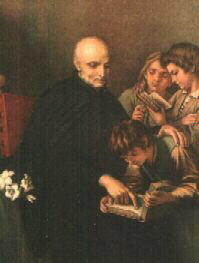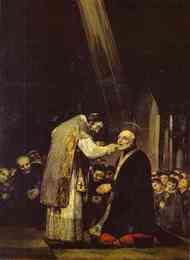
In Rome he afflicted his body with extraordinary hardness of living, with watching, and fasting, and so passed his days and nights in prayer, and in the contemplation of heavenly things. He was used to visit the Seven Churches almost every night, a custom which he kept for many years. Having joined several godly Brotherhoods, it was strange how eagerly he relieved the poor by alms and every sort of kindness, choosing especially the sick and the imprisoned. When the city was ravaged by a pestilence, such was the charitable zeal with which he joined in the labours of St. Camillus de Lellis, that besides the great help which he brought to the sick poor, he would even carry the bodies of the dead on his own shoulders to burial. Having understood from God that his call was to bring up children in godliness and good learning, he founded the Order of the Poor Regular Clerks of the Pious Schools of the Mother of God, who profess as the special object of their Institute a singular care for the teaching of the poor. This Institute received the warm approval of Clement VIII, Paul V, and other Popes, and in a short time obtained a marvellous extension through many provinces and kingdoms of Europe. In this work Joseph Calasanctius underwent so many toils, and patiently bore so many griefs, that he was proclaimed by all men a wonder of endurance and a very image of holy Job.





